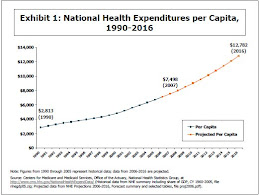It's easy to blame the continual rise in national health spending on inefficiencies and technology, etc. However, the fact of the matter is, how can healthcare spending per capita decrease when problems such as obesity, smoking, alcohol consumption, and drug abuse are on the rise?
At the same time, our economy is rapidly heading towards a depression. In this economic crisis, the number of insured patients is rapidly declining, leaving a huge void in primary care/preventative medicine. That, combined with the steady incline in chronic diseases such as diabetes, coronary artery disease, COPD, and heart failure etc., secondary to our sedentary lifestyle including things mentioned before (obesity, alcohol consumption, smoking) is obviating the need for health care spending to increase. Put simply, more people are sick and fewer people can afford insurance.
The solution to the problem is providing insurance to the uninsured so they may have a platform for preventative medicine and primary care. We also need to create an infrastructure that changes the philosophy of the importance of physical activity and eating healthy so that it is clearly understood by all. In addition, making health insurance more affordable will help avoid some of the shifts in costs that are affecting the people who are currently insured.
As long as we target the source of the problem, we have a chance to come up with solutions for it. If we try and look at secondary outcomes, we will never come up with an effective solution.

No comments:
Post a Comment